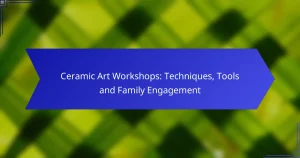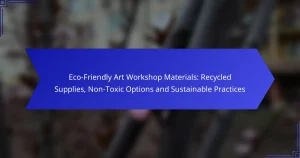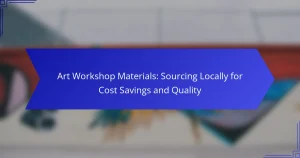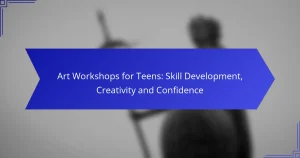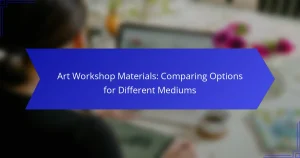Art workshops serve as a vital platform for creative growth, offering structured environments that encourage exploration and experimentation. Whether in New York or Los Angeles, these workshops cater to diverse interests and skill levels, allowing participants to enhance their artistic abilities and express themselves fully. Choosing the right workshop involves careful consideration of factors such as instructor qualifications and participant feedback, ensuring a fulfilling and aligned creative experience.
Art Workshop Marketing: SEO Techniques, Website Visibility and Traffic Growth
To successfully market art workshops, implementing effective SEO techniques is crucial for improving website visibility and driving traffic growth. By focusing on relevant keywords, creating valuable content, and optimizing the…
Ceramic Art Workshops: Techniques, Tools and Family Engagement
Ceramic art workshops offer a unique opportunity for families to explore their creativity together through various techniques such as hand-building and wheel throwing. With essential tools like pottery wheels and…
Eco-Friendly Art Workshop Materials: Recycled Supplies, Non-Toxic Options and Sustainable Practices
Eco-friendly art workshop materials are essential for artists looking to create with a conscience. By utilizing recycled supplies and non-toxic options, these materials not only foster creativity but also promote…
Art Workshop Materials: Sourcing Locally for Cost Savings and Quality
Sourcing art workshop materials locally in the USA can lead to significant cost savings and ensure high quality. By tapping into nearby suppliers, you can minimize shipping expenses and take…
Accessible Art Workshop Locations: Seniors, Mobility and Comfort
New York City is home to several accessible art workshop locations specifically designed for seniors, prioritizing mobility and comfort. These venues offer a variety of creative activities in an inclusive…
Art Workshop Locations: On-Site Supplies, Convenience and Efficiency
Art workshops in major US cities offer a convenient and efficient way for artists of all skill levels to engage in creative activities. These locations provide essential on-site supplies, including…
Unique Art Workshop Locations: Historic Buildings, Charm and Character
Discovering unique art workshop locations in historic buildings can transform the creative experience, as these venues exude charm and character that inspire artists. The rich atmosphere of such spaces not…
Budget-Friendly Art Workshop Materials: Tools, Supplies and Techniques
Creating art doesn’t have to be expensive; budget-friendly workshop materials can provide quality options that keep costs manageable. By choosing the right tools and supplies tailored to the needs of…
Community Centers: Ideal Locations for Art Workshops and Engagement
Community centers serve as vibrant hubs for artistic expression, offering a variety of art workshops that cater to all skill levels. In cities like Los Angeles, these centers provide accessible…
Digital Art Workshops: Software, Techniques and Applications
Digital art workshops provide an excellent opportunity to explore various software and techniques tailored to different artistic needs. Participants can learn essential skills such as digital painting, vector illustration, and…
How can art workshops enhance creative growth in New York?
Art workshops in New York can significantly boost creative growth by providing structured environments for exploration and experimentation. Participants engage in various artistic practices, which fosters skill enhancement and personal expression.
Skill development through hands-on practice
Hands-on practice is a cornerstone of art workshops, allowing participants to refine their techniques in real-time. Instructors often guide attendees through specific projects, enabling them to learn by doing rather than just theory.
For instance, a painting workshop might focus on color mixing and brush techniques, giving artists the chance to apply these skills immediately. This active engagement helps solidify learning and builds confidence in one's artistic abilities.
Networking opportunities with local artists
Art workshops serve as excellent networking platforms, connecting participants with local artists and creatives. These interactions can lead to collaborations, mentorships, and lasting friendships within the art community.
In New York, where the art scene is vibrant, workshops often attract a diverse group of individuals, enhancing the potential for meaningful connections. Engaging with peers can also provide valuable feedback and inspiration for future projects.
Access to diverse artistic techniques
Participants in art workshops gain exposure to a variety of artistic techniques that they might not encounter in traditional settings. Workshops often cover multiple mediums, such as watercolor, acrylics, sculpture, and digital art.
This diversity allows artists to experiment and discover new interests, which can lead to a more versatile skill set. For example, a workshop might introduce printmaking alongside painting, encouraging participants to blend techniques in their own work.
What types of art workshops are available in Los Angeles?
Los Angeles offers a diverse range of art workshops catering to various interests and skill levels. From painting to photography and sculpture, these workshops provide opportunities for creative expression and skill development.
Painting workshops for beginners
Painting workshops for beginners in Los Angeles typically focus on foundational techniques, color theory, and brushwork. Many studios offer classes that accommodate various styles, such as acrylic, watercolor, or oil painting.
Participants can expect hands-on instruction and the chance to create their own pieces in a supportive environment. Workshops often last a few hours to a full day, with costs ranging from $50 to $150 depending on materials and duration.
Photography workshops with industry professionals
Photography workshops in Los Angeles led by industry professionals provide practical insights into both technical skills and artistic vision. These workshops often cover topics such as composition, lighting, and post-processing techniques.
Classes may be structured around specific themes, such as portrait, landscape, or street photography, and can last from a few hours to several weeks. Prices typically range from $100 to $500, depending on the instructor's experience and the workshop length.
Sculpture workshops using recycled materials
Sculpture workshops that utilize recycled materials encourage creativity while promoting sustainability. Participants learn to transform everyday items into art, exploring techniques like assemblage and mixed media.
These workshops often emphasize hands-on practice and experimentation, making them suitable for all skill levels. Costs can vary widely, generally falling between $75 and $200, depending on the materials provided and the duration of the workshop.
How to choose the right art workshop for personal growth?
Selecting the right art workshop for personal growth involves evaluating several key factors, including the instructor's qualifications, the format of the workshop, and feedback from past participants. These elements will help ensure that the experience aligns with your creative goals and learning style.
Assess instructor qualifications and experience
When choosing an art workshop, it's crucial to review the instructor's qualifications and experience. Look for instructors with relevant degrees, certifications, or extensive professional backgrounds in the art field. Their expertise can significantly impact the quality of your learning experience.
Consider the instructor's teaching style as well. Some may focus on technique while others emphasize creativity and exploration. Watching sample videos or attending introductory sessions can provide insight into their approach.
Evaluate workshop formats and schedules
Workshops come in various formats, including in-person, online, or hybrid options. Determine which format suits your learning preferences and lifestyle. For example, in-person workshops may offer hands-on guidance, while online formats provide flexibility and accessibility.
Check the workshop schedule for duration and frequency. Some workshops may span a few hours over a weekend, while others could be weekly sessions over several months. Choose a schedule that fits your availability and allows for consistent practice.
Consider participant reviews and testimonials
Reading reviews and testimonials from previous participants can provide valuable insights into the workshop's effectiveness. Look for feedback on the instructor's teaching style, the workshop's content, and the overall experience.
Pay attention to both positive and negative reviews to get a balanced perspective. Consider reaching out to past participants for direct feedback, which can help you gauge whether the workshop aligns with your personal growth objectives.
What are the costs associated with art workshops?
The costs associated with art workshops can vary significantly based on factors such as location, duration, and the expertise of the instructor. Generally, participants should expect to pay for both the workshop fee and any materials required for the sessions.
Average pricing for weekend workshops
Weekend art workshops typically range from $50 to $300, depending on the type of art being taught and the instructor's credentials. For example, a basic painting workshop may cost around $75, while specialized classes, such as pottery or advanced techniques, can reach up to $250 or more.
It's advisable to compare offerings in your area, as prices can differ based on local demand and the reputation of the workshop provider. Some workshops may also offer tiered pricing based on skill levels.
Materials included vs. materials needed
When enrolling in an art workshop, it's essential to clarify whether materials are included in the registration fee. Some workshops provide all necessary supplies, while others may require participants to bring their own materials, which can add to the overall cost.
For workshops that do not include materials, participants should budget for items like canvases, paints, brushes, and other tools. A rough estimate for personal materials can range from $20 to $100, depending on the medium and quality of supplies chosen.
Discounts for early registration
Many art workshops offer discounts for early registration, which can range from 10% to 20% off the total fee. These discounts incentivize participants to sign up ahead of time, allowing organizers to better plan for the event.
To take advantage of these savings, check the registration policies of the workshops you are interested in. Additionally, subscribing to newsletters or following social media pages of art studios can provide timely information about early bird offers and special promotions.
How do art workshops foster community engagement?
Art workshops foster community engagement by bringing together individuals to collaborate on creative projects, share experiences, and build relationships. These workshops create a sense of belonging and encourage participation in local culture, enhancing social bonds and community pride.
Collaborative projects with local organizations
Collaborative projects with local organizations can significantly enhance community engagement through art workshops. By partnering with schools, non-profits, or cultural institutions, workshops can address specific community needs while providing participants with resources and support. For example, a workshop might work with a local school to create a mural that reflects the community's history and values.
These partnerships often lead to shared funding opportunities, allowing for more extensive projects that can involve a larger number of participants. Engaging local organizations not only enriches the workshop experience but also strengthens community ties.
Exhibitions showcasing participant work
Exhibitions showcasing participant work serve as a powerful tool for community engagement. By displaying the art created during workshops, participants gain recognition and validation, which can boost their confidence and encourage further artistic exploration. Local galleries or community centers can host these exhibitions, making art accessible to a broader audience.
These events can also attract community members who may not have participated in the workshops, fostering interest and potential involvement in future activities. Consider organizing an opening reception with refreshments to encourage attendance and celebrate the artists' achievements.
Workshops tailored for underserved communities
Workshops tailored for underserved communities are essential for fostering inclusivity and engagement. These workshops can focus on specific cultural expressions or address barriers to participation, such as cost or accessibility. Providing free or low-cost materials and instruction can empower individuals who may not have had the opportunity to explore their creativity otherwise.
Additionally, outreach efforts to connect with these communities can help ensure that the workshops meet their unique needs. Collaborating with local leaders or organizations can enhance trust and participation, leading to a more vibrant and engaged community.

